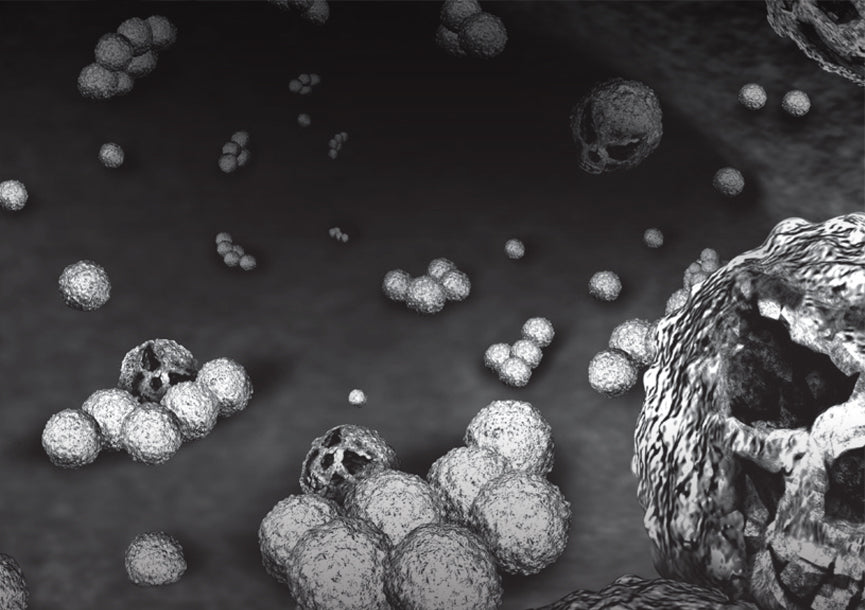MRSA – What is it?

Throughout the healthcare industry, the infection MRSA gets thrown around a lot. But do you really know what MRSA is? Read on to find out.
MRSA stands for Methicillin-Resistant Staphylococcus Aureus. It’s sometimes referred to as the ‘superbug’, especially within hospitals.
MRSA is a bacterial infection that is transmitted in various ways. MRSA is unique in the fact that it can live on the skin harmlessly, enough that people do not often know they are carrying or transmitting the infection.
MRSA, as mentioned, is spread a variety of ways, but mostly by it living on your skin until it is transmitted into the body system, which is known as ‘colonisation’.
It can also be spread much similar to other bacterial infections with contact through skin or surfaces. Unlike many bacterial infections, however, MRSA can be spread by sharing towels, bedsheets, clothes, or any other personal material items.
When on the skin, MRSA is harmless. It is only when it gets deeper into your body that it can start to cause problems
While most symptoms range from mild to medium, MRSA is known to cause disease in some that can begin to take over the tissues within the body. If this is not caught and treated within 72 hours, the infection could become resistant to treatment.
MRSA presents itself in a manner of ways, depending on how far into the body the infection has travelled. If bacteria has entered the skin, typical symptoms start as redness or soreness in the area, along with swelling or even pus. Further into the body, MRSA can cause a high temperature, chills, aches and pains, confusion, and dizziness.
The more severe symptoms are presented as small red bumps, often likened to a spider bite or pimple, sometimes along with a high fever or a rash. If not caught and treated properly then, the bumps can progress to deep, pusfilled boils that are localised to the skin and soft tissue. People aren’t usually hospitalised with this infection unless they are immunocompromised or elderly.
Typically, MRSA is commonly caught in crowded spaces, making facilities such as hospitals or military bases especially susceptible. Other groups of people include those who share dormitories, veterinarians, farmers, those with underlying health conditions, prison inmates, and diabetics, to name a few. Patients in healthcare sectors who are given invasive procedures such as catheters, IV drips, and implants are also at higher risk of catching MRSA.
If you believe you are beginning to see symptoms of MRSA on your skin, you are instructed to arrange an emergency GP appointment. Here, your GP will then swab your skin and test for the presence of MRSA. If the test is positive, you will be asked to attend hospital, where a screen test will typically be carried out throughout 12 hours, and treatment will be provided dependant on severity of symptoms. Normally, when MRSA is only found on the skin and not in the body, antibacterial cream is given as a treatment for application regularly for a number of days, and an antibacterial shampoo is instructed to be used throughout the treatment. Daily washing of material possessions such as clothing, bedsheets, towels, etc, is also recommended to ‘decolonise’ the bacteria and ensure the infection is not spread.
If the infection has entered the body, antibiotics are usually given as a treatment, and you are typically asked to isolate yourself and refrain from touching shared surfaces.
While MRSA is a strange, yet common bacterial infection, several precautions are regularly used within healthcare facilities to reduce the spread of the infection. Regular hand washing/sanitising with solutions designed to kill MRSA bacteria is a necessity, along with proper wound care, regardless of severity, will also help in the long run.
Other precautions hospitals take is to ensure proper decontamination of areas where patients are likely to touch, taking extra precautions when dealing with someone who has MRSA, and the proper washing/disposal of material items that have been used.
Healthcare facilities should have a policy in place to ensure these procedures are regularly carried out, and who is liable/responsible for the implementation. Personal hygiene is pivotal in crowded areas outside of the healthcare sector, as well, to prevent the spread of any bacterial or viral infections.
The Medi9 range
More details on the entire Nine Group
range can be found on our website or by
scanning the QR code:
ninegrp.com/collections/medi9



















